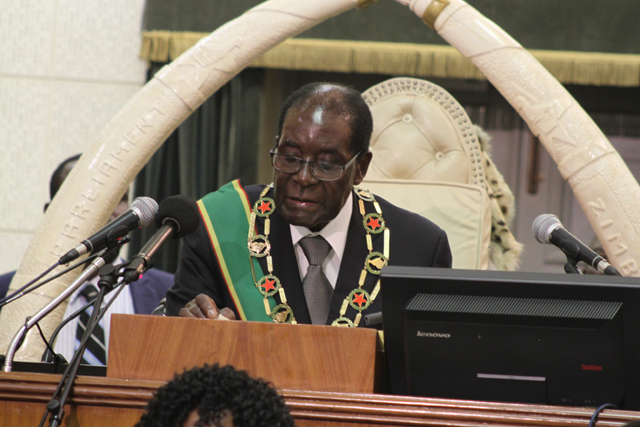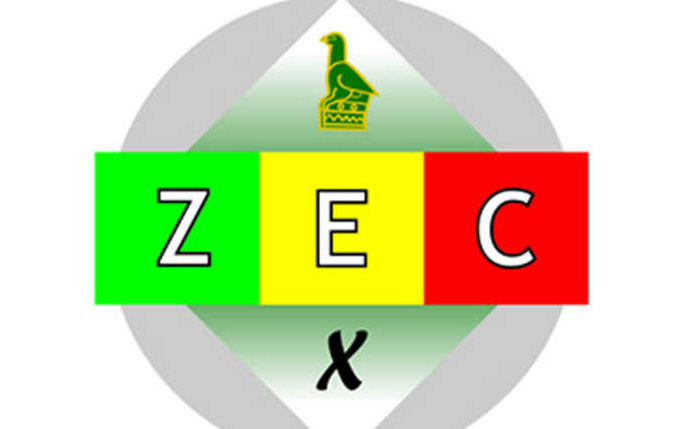Cashless society becoming reality

BEATING CASH CRISIS . . . A fruit vendor uses a Point Of Sale machine to sell mazhanje along Borrowdale Road in Harare recently
Delta Milayo Ndou #Digital Dialogue
A recent picture of an enterprising legal vendor who uses a portable POS device (also referred to as a swiping machine) to facilitate transactions with his clients got me thinking of how attainable the goal of a cashless society is and also reflecting on obstacles that hinder its realisation. Responses to that image on social media were mostly enthusiastic and encouraging as the majority felt this vendor was being highly innovative by leveraging on alternative payment solutions at a time when cash is scarce.
I was especially gratified that my colleague, the editor of H-Metro, took time from his busy schedule to “go on the ground” to verify the story of a POS transacting vendor that was doing the rounds on social media seeing as hoaxes are all too prevalent.
According to my reliable aforementioned source, the mazhanje vendor (henceforth referred to as the fruit vendor) is licensed by council, operates from a fixed location along Borrowdale Road, before Sam Levy’s Village when one is travelling from the city and he requests that those opting to buy his product via swiping machines spend at least $10.
The convenience afforded to clients is too obvious to state, but the ingenuity displayed by this vendor deserves attention and hopefully other vendors and businesses will follow suit.
My optimism about the feasibility of a cashless society, which had been raised by this vendor, took a knock when I visited a Total garage along Robert Mugabe Way in Bulawayo.
I was told they did not offer a POS payment facility which I could not accept as prior experience there had always involved using a swiping machine to buy fuel.
Upon being grilled on this inconsistency, the fuel attendant sheepishly admitted “sebawakhipha (they have removed them)” and proffered no explanation as to why, in the midst of a biting cash shortage, a whole garage would decide to make it that much harder to enjoy cashless transactions.
This is the worst sort of regression.
The Reserve Bank of Zimbabwe (RBZ) must lead the charge on cashless transacting
RBZ Governor John Mangudya is a man who does not take it lightly when bond notes are trifled with, if his slapping of POSB with a half-a-million-dollar penalty over the unprocedural taking and sharing of photos from a bank vault containing bond notes is anything to go by. I would be gratified if the same non-nonsense approach was adopted with regards to getting fuller compliance with the requirements of facilitating cashless transactions to shield consumers who are getting raw deals at every turn.
For starters, the RBZ needs to engage in an aggressive drive to popularise and facilitate the widespread adoption and use of POS devices within the informal sector — popularise not prescribe.
If a fruit vendor can adopt the POS system as a payment solution, so can many others, but obviously not all.
This particular vendor has several things going for him; firstly he is licensed and to that extent not subject to being harassed by council.
But not all vendors are licensed, some simply do not have the means (and sometimes the desire) to get licensed.
Secondly, the vendor is well located and operates within a suburb where his targeted clientele is accustomed to using swipe machines and as such, more likely to whip out their cards without bating an eyelid.
Thirdly, the vendor has taken the time and initiative to gain the necessary literacy to operate a POS device, one cannot take for granted that others would be interested in acquiring the POS device and the knowledge to use it.
Fourthly, this vendor can evidently afford to have a POS device, and given their still relatively low penetration, this may not be the case for others.
Fifthly, the clientele that this vendor is targeting happens to be from more affluent suburbs and can presumably absorb the generally steep transaction charges that the POS system tends to attract.
If the RBZ is serious about entrenching a culture of cashless transactions and realising a cashless society, then they need to make use of these trying times to create an environment where alternative payment solutions are conveniently, affordably and safely adopted.
For starters, what stops the RBZ from facilitating the affordable bulk purchase of POS machines, ensuring that banks lower transacting charges, putting in place mechanisms to hire out POS machines to the informal sector whilst providing the necessary basic training required to operate them, also guaranteeing that banks will expeditiously link these devices to their systems with highest level of security protocols to guard against cyber crimes such as card cloning?
I ask this from a place of perplexion seeing as I have no intimate knowledge of how the banking sector works, but if a cashless society is to be realised, perhaps the apex bank can let us in on the strategies they intend to pursue towards meeting that objective, because as early adopters, some of us are eager to not have to queue for cash if other acceptable payment options are available.
Necessity is the mother of technology adoption
I learned, at recent workshop with some Parliamentarians that ATMs and ATM cards have been around since the 1990s and their adoption or use was rather slow in the beginning and later stalled following the adding on of so many zeroes on our currency as to make it impossible to properly configure ATM machines.
I don’t know how accurate that assessment is, but it is a persuasive argument and more importantly, it is telling of how the success of technology-driven solutions ultimately lies in the extent to which they are adopted by the markets in which they are introduced.
Oftentimes technology is adopted when it provides convenience to the user and offers a benefit great enough to incentivise individuals to suffer the temporary discomfort of changing the way they have always done things.
In our circumstance the inverse might hold true, in that it is possible that the inconvenience of cash shortages will be what spurs many to look for and adopt alternative payment solutions so as to avoid the trouble of failing to transact.
In other words, the economic status quo is fertile ground for the emergence of need-driven adoption of technology — people will be driven to adopt new payment solutions for no other reason than that they have been backed into a corner and must adapt.
It is frustrating to be denied options where one’s hard-earned money is concerned and I share the consternation of many with regards to the ever-increasing restrictions being placed upon us by banks with regards what, where and how we can spend.
I find it especially annoying that we must now, in the manner of kids, be expected to explain to banks why we need the money we are asking for whenever we have to travel outside the country.
Granted, the situation warrants such vigilance and monitoring to ensure banks are not conned by those who do not want to follow the rules everyone else has to abide by as far as withdrawal limits are concerned.
But surely, some of these constraints border on abuse of our persons and violation of our dignities, especially if no convincing effort is being made to ensure alternative payment solutions to cash are accessible, convenient as well as affordable to adopt and use.
We did not create this mess and we refuse to be the ones bearing the interminable brunt of it.
Some of us are ready, even today, to transition into the utopia of a cashless society, but RBZ needs to ensure that we do not incur losses in pursuit of adopting payment solutions that can ease our cash woes. We will do the needful, but RBZ and the banking sector must do the heavy lifting.
Delta is Head of Digital at Zimpapers. You can follow her on Twitter: @deltandou








Comments